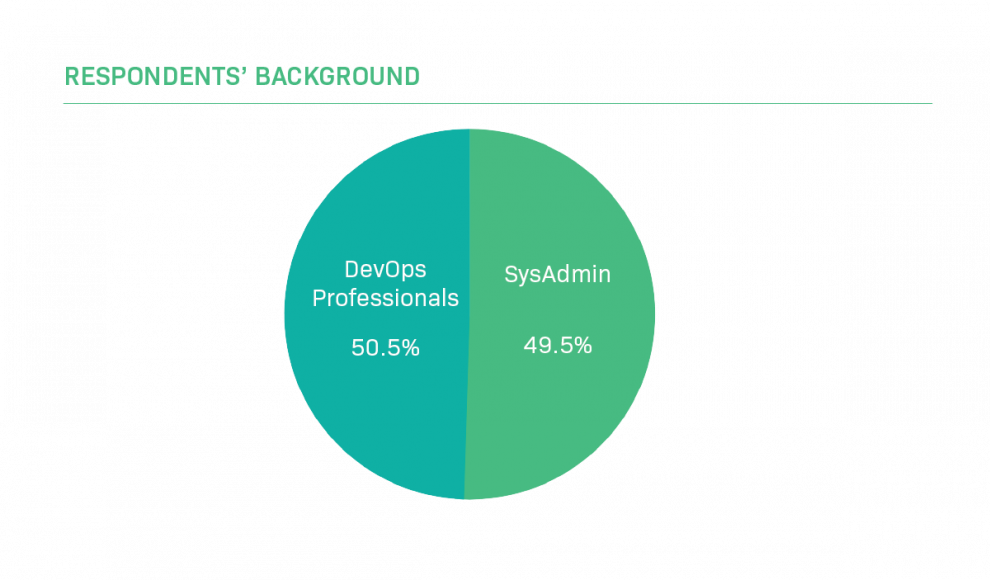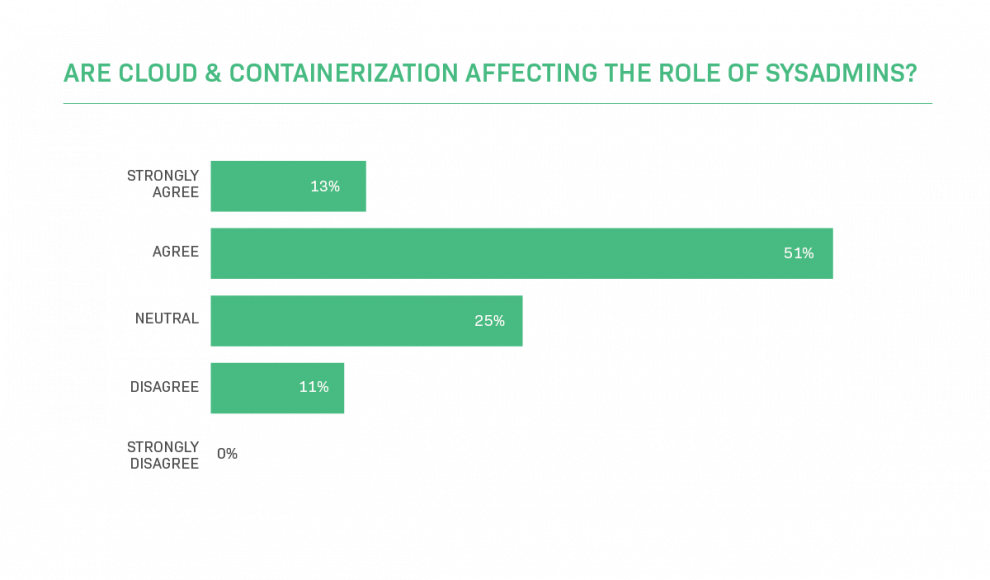IT has been going through fundamental changes in the last few years, with the DevOps movement and many organizations pushing containerization and cloud projects. It is clear that all these things impact the daily life of sysadmins. But how are sysadmins being impacted exactly, and what are the actions a sysadmin should therefore take to remain relevant – or to become even more relevant?
We at tribe29, the creators of Checkmk, have always dedicated our entire efforts to making the lives of sysadmins better. Thus, for the SysAdmin Day, we asked a couple of questions of people in IT operations (e.g. SysAdmins, DevOps practitioners and related job titles) regarding their career, and the recent trends they are seeing. Here’s a summary of what we have found out!
First, we saw two kinds of groups who participated in the survey:
1) individuals who mainly take care of the infrastructure
2) individuals who do the same, but also work closely with development teams

We had an interesting turnout, with half belonging to the first group and half belonging to the second group. No one replied that they only support dev teams. For convenience, we will refer to those handling mainly IT infrastructure as SysAdmins, and the others as DevOps Professionals. We know that the use of this term is probably terribly wrong as there is no DevOps Professional – but let’s stick to it for simplicity. And now let’s get started with some insights!
The ‘cloud’ and containers are here – so we’d better deal with it

While the answer to that is not a surprise, the interesting info is in the details. Almost ⅔ of the sysadmins (yes, you read right: sysadmins, not the DevOps professionals) agreed that their role has changed due to cloud computing and containerization. What we find interesting is that more than 10% strongly agree with the statement – so there is a significant number of people out there who are deeply-impacted.
The 10% who disagree stand out: it looks like you are the exception, and this might be rather due to the specific environment you are working in – and this can change quickly! What we see with many of our customers is that both of these topics are often mandated top-down from management. Therefore while many SysAdmins might find this shift uncomfortable, it’s important to adapt to these trends and not ignore them.
Don’t move everything to the cloud
Digging deeper into the effect of the cloud in the evolution of the SysAdmin role, we asked the respondents for their strategy of choice if they ever need to rebuild their company’s infrastructure. Managers – you had better listen now!

The cloud comes with many benefits – this seems to be clear to almost all respondents, apart from a few who would avoid the cloud at all costs. The drastic decision to either migrate everything to the cloud, or the other extreme to keep everything in your own infrastructure is not supported by the majority of respondents (77%). Rather the consensus seems to be to carefully weigh your options and decide for each application where to deploy the load to.
This suggests that the new challenge for SysAdmins is to be flexible in maintaining two types of infrastructure, instead of putting all they have in one place. Getting a good understanding of the benefits of each technology is also helpful. Then you can carefully consider all options and not only go with what you already know and what you feel comfortable with.
The age of automation
To stay up to date in the industry, especially if you’re currently seeking a new role, it’s helpful to have an idea of the projects that companies are currently running. To our surprise, the biggest topic was deployment automation and config management. Most respondents replied that they have seen big projects in this area in their company over the last 3 years.
As we have seen before, containers and the cloud are also among the top projects here, but far less than automation. On a similar level is application performance monitoring (e.g. tracing).
An IT Operations professional or an aspiring one should expect to see more of these initiatives in the future and should learn the skills needed to execute them. Especially for automation, there is a plethora of tools available. We ourselves use Ansible, which is one of the more prominent tools, but there are also Chef, Salt and so on.

The Most Important Tools
It’s important to know the tools of the trade, and mastering them isn’t necessarily a walk in the park. Hence, it is important to know the most important types of tools that SysAdmins use to prioritize what one needs to learn.

The majority think that Monitoring, Automation/Config Management and Virtualization tools are very important for them to stay on top of their work. Each of these is already a big area by itself. Thus, focusing on one single area as a SysAdmin might not be the best idea. Rather, try to get experience in a number of areas. And as one respondent put it quite well: “SysAdmins have to automate more of their work– to do so they must push vendors to improve APIs”.
This also brings us immediately to the next topic.
The Most Important Technical Skills
To stay on top of your work as a SysAdmin, it is important to know what you should learn for your personal development. Our respondents shared what they have learned or have been learning in the past year. We grouped the responses based on the type of SysAdmin.

The results show that the skills needed vary depending on what type of SysAdmin you want to be. If you want to be a SysAdmin dealing mainly with infrastructure, it is more important to know how to effectively monitor the infrastructure. On the other hand, a DevOps professional would give more priority to knowing Programming/Scripting than to monitoring the infrastructure.
No matter what you prefer, programming/scripting is the key to everything you do. It will help you automate things and help you accomplish more. Combining this with automation and virtualization – and you can actually live Infrastructure as Code and hopefully make your life easier and less stressful.
“Sysadmins should learn how to code in Python and shell script. These are must-have skills. Monitoring should be treated more seriously, and CI/CD pipelines should be components and be owned by multiple teams in order to ensure that no single team has too many power/security influence.”
“Sysadmins have always needed to know how to code, and realistically, the monitoring approach needs to be harmonized between devs and infra teams. It is good that the need for operations people to have programming knowledge is now more recognised.”
Skills to Learn to Get into IT Operations
For people aspiring to become a SysAdmin, it’s helpful to have an idea where to start. We asked SysAdmins what they would recommend people to learn to become like them, again grouped by the type of SysAdmin.

The result shows almost equal regard for all of the topics (except CI/CD). However, it suggests that for any type of SysAdmin that one wants to become, it is a minimum expectation to know about Automation/Configuration Management and Monitoring. But as said before, don’t build only an island of expertise, rather build your skills broadly.
“SysAdmins need to be more competent in knowing when code is wrong and the problem is not with the infrastructure. In my experience, most of the time sysadmins/infrastructure engineers are not always sure if they are the one to blame for errors.”
“I believe automation, scripting, and understanding when cloud solutions are worth the investment are all key technical aspects to know about.”
These were our SysAdmin Career Trends 2020 – Stay tuned for more!
A big thank you to all who answered our survey 'SysAdmin Career Trends' and spent time sharing their detailed insights on the topic! This was just an excerpt of all the insights we were able to get. There is much more, and we will release more of our analysis in the future. Stay in touch with us by subscribing to our blog, signing up to our newsletter, or following us on Twitter and LinkedIn.
